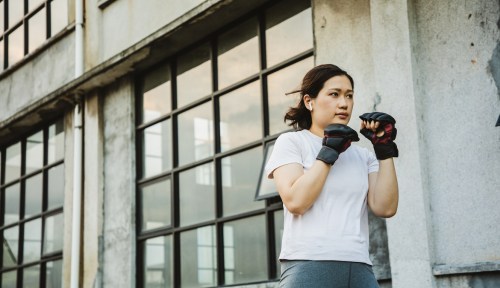The Most Important Safety Dos And Don’ts of Protecting Yourself, According to a Self-Defense Instructor
Prevent, slow down, escape, and resist a physical assault with these self-defense do's and don'ts, according to a self-defense instructor.

Self-defense is much more than knowing how to fight back physically against somebody. It’s a sense of awareness, control, assertiveness, strategy, and empowering technique to help you successfully prevent, slow down, escape, and resist any type of assault.
Experts in This Article
professional MMA fighter, ACSM-certified personal trainer, and ACE-certified nutrition coach
A study by the U.S. Department of Justice found that women who complete a self-defense course are 50 to 60 percent less likely to be sexually assaulted, and 33 percent less likely to report that someone had attempted to rape them. While not all attacks are physical (or sexual in nature), one in four women (and one in 10 men) will experience domestic abuse in their lifetime, according to the Centers for Disease Control, so everyone can stand to gain from learning how to protect themselves from a possible attack. Here’s a list of dos and don’ts from self-defense coach, Pro MMA Fighter, and TikTok’s self-defense expert, Chelsea Kyann that you can use to prevent or mitigate a physical assault.
Self-defense dos
1. Do pay attention to your surroundings and stick to groups when you go out
Situational awareness is a concept that you can practice. Knowing what’s happening around you at all times, especially in unfamiliar places, gives you an advantage in the case of an attack. “Pay attention to your surroundings and stay in groups when you’re going out,” shares Kyann. “It’s always safer to be in a group with others than just being by yourself.” If you are by yourself, don’t get distracted by your phone or music. Be alert.
2. Do alert loved ones of your whereabouts
A 2020 study by Panda Security found that 18 percent of respondents shared their GPS location with their family, 11 percent shared the data with their friends, and 9 percent shared it with their partners. Whether digitally or not, “let others know where you’re going and when you’ll be back,” says Kyann. Better yet, she suggests having a “designated safety buddy” who knows your whereabouts at all times.
3. Do choose 3 to 5 self-defense techniques and get good at them
Practice makes perfect, and this is the case for self-defense moves too. “Don’t try remembering a bunch of different things,” says Kyann. “Pick three to five go-to moves and build muscle memory. That way, they will become second nature in a stressful situation.”
4. Do trust your gut
There’s evidence-based science in the saying, “trust your gut.”Neuroscientists at the University of Southern California have found that the insula of our brains (the part responsible for social emotions like pride or guilt), and the amygdala (which cues our response to threats) send messages when something does or doesn’t feel right. “If you feel the need to exit a situation, don’t hesitate to do so,” says Kyann.
5. Do speak up for yourself and make boundaries
Not having boundaries and a precedent of not speaking up when uncomfortable can be dangerous and lead to risks. “Speak up for yourself when you’re uncomfortable,” says Kyann. “Make eye contact and speak firmly when you are setting boundaries and practice speaking up, even when it’s hard.”
Self-defense don’ts
1. Don’t think one self-defense class is enough
While there’s no magic number, learning to protect yourself from physical harm is not a one-and-done type situation. “It takes regular practice to remember and efficiently use self-defense techniques, especially when you are in fight-or-flight mode,” Kyann Says.
2. Don’t post your location on social media while you’re still there
While many use location services for safety reasons, social media geotagging can be dangerous, especially in the moment. “Don’t post your location on social media when you’re still there, especially if you’re alone,” warns Kyann. A study by Digital Information World revealed that one in four people admitted to checking an ex’s location after a breakup using social media or location services. Men were more likely than women to do this.
3. Don’t leave your drink unattended
We’ve been told this by our parents to prevent unknowingly being drugged, and Kyann takes it a step further: “Don’t accept drinks from strangers,” she says adding that there are lots of safety products that can help you keep your drink safe like a NightCap, a cup cover that can be worn as on your wrist like a scrunchie when not being used.
4. Don’t blame yourself
This is the most important thing to remember if you are attacked. “It’s not your fault,” says Kyann. “Report the issue and seek out help from local resources, family, and friends.” You may be able to prevent another person from going through what you’ve gone through.
Sign Up for Our Daily Newsletter
Get all the latest in wellness, trends, food, fitness, beauty, and more delivered right to your inbox.
Got it, you've been added to our email list.








